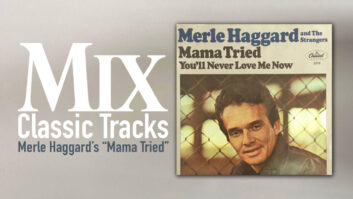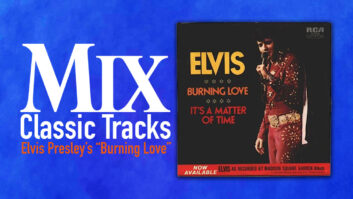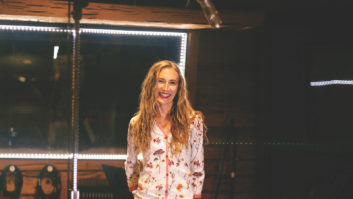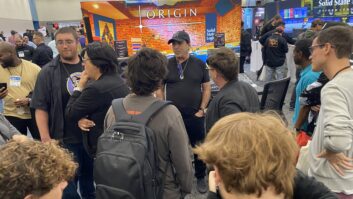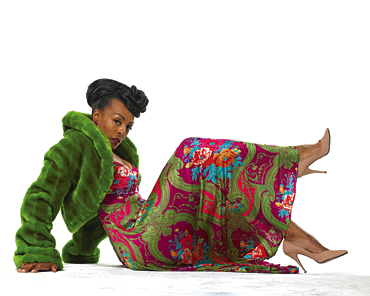

One of the most successful African pop bands in Europe (and, increasingly, America), Zap Mama is largely the alter-ego of its founder and lead vocalist Marie Daulne, who has led an ensemble of talented singers and dancers since conceiving the group in 1990. Daulne’s roots are still firmly planted in her native Africa: She was born in the Congo (what is today Zaire), and her white Belgian father was killed during the 1960 revolution for independence there while her African mother was pregnant with her. After taking refuge with a tribe of Pygmies in the forest, the survivors fled to Belgium, where Daulne was raised and Zap Mama formed.
When Daulne was growing up, her mother filled their home with music from the Congo. Daulne also listened to European and American pop, R&B, folk and jazz. After high school, Daulne traveled to Zaire and immersed herself in the music there, even studying Pygmy vocal techniques. Upon returning to Europe, she was consumed with a mission to meld the earthy characteristics of the Congo with appealing contemporary European music in what she dubbed “Afropean music,” and she enlisted four other like-minded vocalists to work in a completely a capella setting.
Several years later, the group was signed to David Byrne’s Luaka Bop label, releasing Adventures in Afropea I, the company’s all-time, top-selling non-compilation CD (and a former Number One on Billboard‘s World Music chart). Zap Mama’s second recording, Sabsylma, garnered a Grammy nomination in the same category and a strong legion of fans. In the late ’90s, Daulne’s group was transformed from a cappella to one with instrumentalists, and the group’s albums since have reflected this move toward a more mainstream sound. Their latest, Supermoon (on the Heads Up label), is perhaps their most commercial-sounding effort to date.
It is also Daulne’s most collaborative disc. “I’m always in my world,” she states from her home in Brussels, Belgium, “and I decided to follow somebody and be more in their world. I’ve never experienced that before, and I always bring the melody, the harmony and everything. I’m talking about [co-producer] Chris McHale — he brought in musicians he knew real well and had me find different ways to harmonize with myself.” Distinctive players such as drummer Tony Allen, bassists Me’Shell Ndegéocello and Will Lee, guitarists David Gilmour and Michael Franti (also a singer), and many other musicians were asked to bring their energy and creativity to the sessions. Daulne has worked with McHale on commercials, film scores and CD tracks for a decade, so there was already a high level of trust in their working relationship.
“They’re all daring musician/artists, and I was amazed at how beautiful the harmonies were and the type of chords that could be put behind African vocals,” Daulne comments. “It was perfect and exactly what the tracks needed.”
Daulne started working on the songs for this album three years ago. She normally finds her inspiration on the road, and she reveals that some of the songs on Supermoon were conceived in Adelaide, Singapore, the Coachella music festival, Austin, Tokyo, New Orleans and numerous other parts of the world. The singer/producer laid the groundwork for the tracks during the course of a year at her home facility, Studio Dada, which is equipped with a Pro Tools HD system, Audio-Technica microphones, Avalon preamps and a variety of samplers, keyboards and other instruments. Sometimes during these early stages, she also brought in the other singers — Celine ‘T Hooft, Sabine Kabongo, Cecilia Kandonda and Sylvie Nawasadio, who have been recording and touring with her for 11 years.
Daulne likes working at home because it affords her more time with her two children and she can choose her own work hours. “I’m slow,” she admits, “and prefer to work with an engineer who watches the technical part of the recording. But when I can go deep inside my creativity, it’s good when I’m alone. For this album, during that period I composed over 40 tracks.”
Mark Harder, engineer for McHale at New York’s Irving Place, oversaw all the raw material Daulne had recorded in Brussels and at Luc Weytjen’s Studio in Antwerp, Belgium. The engineer also did overdubs with her and two completed tracks — the title and “Where Are You?” (co-produced by McHale and Michael Leonhart).

Harder says, “A lot of this record was starting a session here, then going over to Europe and doing some things. It comes back here, we do some things and it goes back and forth. This was one of those projects that was not really done on a time frame, but more on a vibe and availability.” Though a little fuzzy about specific dates, Harder believes he started working on Supermoon in mid-2005 and continued throughout 2006, roughly a year and a half. During that period, Daulne would typically come to New York for a week at a time, rent an apartment and work from about noon till 2 or 3 a.m.
“The several things we did here were more aimed at crossing over Marie from the world-music scene to one a bit more commercial, but maintaining the integrity to her longtime Zap Mama fans,” Harder notes. “The idea was to move from a groove base/world feel to elements of commercial triple-A radio.”

Working with material culled from different sessions in different countries on some different equipment proved to be one of the project’s more challenging aspects. As Harder details, “Some of the tracks were a background sax, a rough vocal and Marie loving the second verse. That would stay and then we would have to do the first verse to match it, but with different equipment and the original done at 3 o’clock in the afternoon as opposed to 3 a.m. We had to work on her trusting us to get all that intimacy with the pop filter six inches away. Vocally, what we ended up using mostly was a reconditioned U87, an AMX mic preamp and a compressor on her vocals. For some special situations, such as the song ‘Princess Kesia,’ which is very lush and mysterious, we used an Audio-Technica 4050 and a Hardy preamp.”
Axel Niehaus (a native of Cologne, Germany) mixed the project at Irving Place using a combination of vintage gear and modern plug-ins to achieve the warm, analog sound Daulne and McHale were looking for.
“[For Zap Mama,] I used a summing amp and I had the Dangerous 2-Bus and my API 2500 stereo bus compressor for a sound I just can’t get with a plug-in, along with three Neve 1102 compressors and a beautiful old Pultec,” Niehaus says. “Marie is also used to bigger analog studios and completely aware of what a tape machine will do to her music and what a compressor will do to her voice.”
Even while the mix was taking place, Daulne was constantly adding elements and improving takes. “With a soul like this, she never stops,” says the mixer. “You let the project sit for a day, and when you come back there’s a whole choir at the end of a work in progress. She gets inspired: ‘Oh my God, I hear African percussion!’ Then Chris goes over to the computer, and 10 seconds later you have an entirely different thing to deal with. That was enlightening to me, and Chris being from the ad world had plenty of media in his hands. It made a difference in the creative process, and we were able to adjust pretty quickly to Zap Mama’s every need. It was a lovely time, and [Daulne] is an amazing artist.”
In addition to the work done at Irving Plaza, there was more tweaking and mixing by Harder and some by Dave O’Donnell and one track by Luc Titgat.
In closing, Daulne notes, “Previously, I had helped but I never did a whole album. This is the first time I did my own and paid for everything. That was something new and hard. Now I’m ready to produce others and know how to do it.
“Keeping the music positive balances the energy of the world. When you’re having a bad day or something goes wrong, music can be magical and bring you happiness. This is what I do every time through songs and performances.”

LISTEN: Must Play
1,000 Ways
LISTEN: Must Play
Princess Kesia
LISTEN: Must Play
Where Are You


